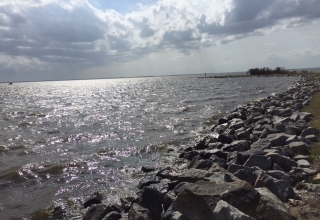
Dan Ariely (2012, p. 214) offers the well-known narrative about broken windows in an urban slum to make the point that small crimes and lies can make quite a difference in modeling and setting the setting the stage for much bigger crimes and lies. A few windows that remain broken in a community can produce a culture of indifference and hopelessness. Similarly, a group that tolerates small amounts of misinformation and minor self-deception will build a “broken” culture in which the world is profoundly distorted and destructive actions are engaged on behalf of this distortion.
We might even suggest that not only is the broken truth not repaired—it is actually shattered into even smaller fragments and new truths are sought that can themselves be broken. Perhaps the most important truth to be broken is one that suggests the group is operating in a thoughtful and caring manner. The group process is labeled collaboration and cooperation when it is, in fact, collusion [Bergquist.2013]
We turn now to the second dynamic operating in groups that leads to distortion and misuse of information. This is the dynamic of collusion. This dynamic is often identified as collaboration when it should be seen for what it really is: a powerful, often unconscious, agreement between two or more parties to accept and support erroneous beliefs and actions. (Bill’s essay). (Ariely,2012 p,.221)
Given these powerful forces operating in the group we have joined and society in which we live, perhaps we should live alone in a cave somewhere—be oblivious to the influence of other people. While this solitude is ultimately not possible in our mid-21st Century society, Ariely, 2012 p.233) suggests that it is ultimately not desirable. At the same time, he issues a warning:
Of course, we cannot survive without the help of others. Working together is a crucial element of our lives. But early, collaboration is a double-edged sword. On the one hand, it increases enjoyment, loyalty, and motivation. On the other hand, it carries with it the increased potential for cheating. In the end-and very sadly-it may be that the people who care the most about their coworkers end up cheating the most. Of course, I am not advocating that we stop working in groups, stop collaborating, or stop caring about one another. But we do need to recognize the potential costs of collaboration and increased affinity.
Formulate a cause, emergency or threat
It is not enough simply to adopt in-group values and goals, it is necessary to leverage urgent threats and emergencies of immediate importance to the in-group: Trump was highly effective at pointing to immigration, attacks on gun-rights, religious freedoms and other concerns important to the conservative right. He established himself as the champion to lead conservatives against these threats. In this fight, Trump was able to position any leader or expert that opposed him as core to the threat. Psychologist and Nobel Prize winner Daniel Kahneman (Thinking, Fast and Slow) describes that threats and negative messages gain much more of the brain’s attention and much more quickly (“less than one-quarter of a second”) – “Bad emotions … have more impact than good ones”, and Trump is a master at using negative threats in his messaging.
Point to an enemy (and demean and vilify them)
Trump was (and is) the Machiavellian master at identifying enemies and rallying his followers against his opposition and enemies. Beginning with fellow Republican political challengers, calling Jeb Bush “Low Energy Jeb”, Ted Cruz “Lyin’ Ted” and Marco Rubio “Little Marco”, and ultimately to his immediate enemies such as Hilary Clinton “Crooked Hillary” or “Fat Jerry” for Jerry Nadler. During the height of Covid-19, Anthony Fauci was “Full of Crap”.















